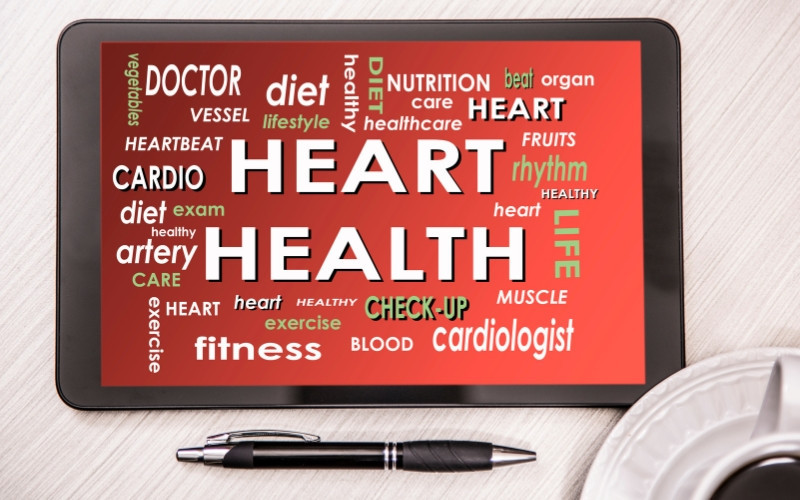In the hustle and bustle of modern life, our hearts bear the weight of stress, erratic schedules, and unhealthy habits. Let’s learn 13 Healthy habits for the heart; a heartfelt journey to wellness.
The key to preserving this vital organ lies in a comprehensive approach that includes both the physical and emotional aspects. Welcome to a journey illuminating the path to a healthier heart – a journey fueled by optimism, self-care, and mindful choices. Let’s look at some secrets to a healthier heart.
13 Healthy Habits for the Heart; a Heartfelt Journey to Wellness
1-This journey begins with a resounding call to “Stay Positive!”
Not only is optimism good for the soul, but it can also counteract stress. The more relaxed you are, the less chance you have of developing heart disease.
Positivity emerges as a tool that effectively counters stress hormones and inflammation in the arteries.
2-Laughter is a great way to reduce stress hormones.
Laugh it up! A joke or two can lower stress hormones and reduce inflammation in the arteries.
Our fast-paced lives often leave us entangled in a web of anxiety and strain. This takes a toll on our cardiovascular health.
It has been scientifically proven that optimism not only nourishes the soul but also acts as a shield against stress.
A heart brimming with positivity is resilient, and its chances of succumbing to heart disease are significantly diminished.
Laughter is the universal language, and it emerges as a powerful tool to battle stress hormones.
As you read on, discover how simple acts of laughter can pave the way to a healthier heart.
3-Slow it down.
Remember old-fashioned diversions. Oh, and speaking of slowing down – in this digital whirlwind, let’s unplug from the digital world, put down those screens for a sec, and remember the good ol’ days.
The mere act of writing a heartfelt letter, losing oneself in the pages of a beloved book, or belting out a cherished melody has a remarkable ability to make you feel young again.
Write a letter, read a book, or sing a song you used to love.
4-Sufficient Sleep – Catch some Z’s.
As twilight falls, the importance of sleep cannot be overstated.
“Catch Some Z’s” dives deep into the connection between sufficient sleep and cardiovascular health.
If you want a healthier heart, you must honor the body’s need for restorative sleep.
According to the National Sleep Foundation, “People who don’t get enough sleep are at higher risk for cardiovascular disease—regardless of age, weight, smoking and exercise habits.”
Get enough regular sleep each night, and let your heart do a happy dance.
5-Know Your Numbers
Next up, let’s be heart-smart and “Know Your Numbers.
” Talk to your healthcare provider about where your cholesterol and blood pressure should be and come up with a plan to keep them there.
Control your cholesterol. Have your blood pressure and blood sugar checked regularly.
Keep your blood pressure in check. … High blood pressure causes constant strain on the heart.
Embrace knowledge and awareness. Engage in regular health assessments and informed conversations with your healthcare providers.
These discussions pave the way for an important part of a heart-healthy lifestyle. Through this partnership with medical practitioners, you are ready to tackle your heart health like a pro.
6-Weight Management
Work on maintaining a healthy weight. Excess weight puts additional stress on your heart.
“Every pound of weight we put on is another 5 miles of blood vessels. If your heart beats 100,000 times a day, that’s 500,000 miles a day for one pound of fat,” says Dr. Kopecky. Of the Mayo Clinic.
7-Exercise Regularly
“Your heart is a muscle, and just like your pecs or abs, it needs to be worked out consistently to stay strong,” says Dr. Lee.
The American Heart Association recommends 30 minutes, 5 days a week of moderate exercise. Increase regular physical activity to at least 2.5 hours per week.
Feel-good hormones and exercise. Moving your body is not just for shedding pounds, but it is also good for your heart. Exercise increases the feel-good, mood-boosting endorphins in your body.
8-Reduce your stress levels.
Find time for yourself. Practice self-care. Get regular exercise and make it a point to increase your activity level throughout the day to reduce stress.
9-Eat a heart-healthy diet of whole foods.
Balance your diet with healthy fruits and vegetables, and low-fat proteins.
Berries, blueberries, strawberries, blackberries, and raspberries are chock full of healthy phytonutrients and soluble fiber.
Flaxseeds contain omega-3 fatty acids, fiber, and phytoestrogens to boost a healthy heart as well as heart healthy salmon.
Reduce salt since too much salt can increase the risk of major health problems.
Herbs and spices are a good way to make your food tasty.
Limit saturated fats and cut down on your sugar intake as well.
10-Stay hydrated.
Your body is made up of at least 60% fluid. It works best when you give it a daily supply of water.
Eight glasses of water is often the suggested amount of water to drink each day.
A well lubricated body doesn’t have to work as hard to keep you healthy.
11-Take your vitamins.
Cardiovascular diseases have been linked to certain vitamin deficiencies.
It’s best to get your nutrients from food but be sure to check with your medical provider about whether supplements like fish oil and vitamin D might benefit you.
12-Use alcohol in moderation.
Some studies suggest that red wine may have antioxidant effects on the heart and help relax blood vessels and reduce inflammation.
However, if used in excess, alcohol can raise blood pressure, weaken heart muscles, contribute to irregular heartbeats and other heart problems.
Remember moderation is the key. If you choose to drink, do so responsibly, within the recommended limits to safeguard your health. A medical professional can give you personal advice.
13-Don’t use tobacco… quit smoking.
Tobacco is not just hard on your lungs; it stresses your heart as well.
The toxic chemicals mess with your blood vessels, making them narrower, and forces your heart to work overtime, pumping harder to push blood through.
Smoking is a one-way ticket to high blood pressure, atherosclerosis, as well as making breathing more difficult.
The chronic strain elevates blood pressure, and over time weakens your heart. This raises the risk of heart attacks and strokes, as well as other cardiovascular complications.
Kicking the habit is being kind to your heart.
Exercise and a healthy diet can help control cholesterol levels.
Regular physical activity, such as brisk walking, swimming, or cycling, helps transport excess cholesterol to the liver for elimination.
This process reduces the buildup of plaque in your arteries, lowering the risk of atherosclerosis and heart disease. It also helps with weight management.
A heart-healthy diet reduces saturated and trans fats. Healthy fats like those found in olive oil, nuts, seeds, and fatty fish can help lower the LDL (bad or lousy) cholesterol levels in the body.
Healthy Habits for the Heart – Top Ways to Reduce Stress (and Save Your Heart)
How Do You Relax Your Heart?
- Yoga.
- Gratitude.
- Meditate or pray.
- Breathe deeply.
- Listen to music.
- Laugh more often, develop a good sense of humor. Laughter reduces stress hormones.
- Go for a hike. Go outside and get some fresh air. There’s nothing like taking a walk and breathing in the great outdoors.
Please Leave a Comment
What are your Healthy Habits for the Heart? How do you relieve stress and stay healthy?
Disclaimer: If you have any concerns or questions about your health, you should always consult with a physician or other healthcare professional. No content on this site should be substituted for direct medical advice from your doctor or other qualified healthcare practitioner. The information contained here is for informational purposes only. It is from my research and personal experience.
Related Posts
11 Heart Healthy Activities for Adults
25 Healthy Habits and Hobbies to Boost Your Mood this Year
How to Change Your Mindset and Lose Weight
11 Working Out Health Benefits at Any Age





I think as we get older the need for all these preventative measures increases because not only do we become more sedentary and tend to put on weight, but life also seems to get busier and more stressful than when we were younger. Suddenly it gets harder to keep that blood pressure down and the cholesterol in check. Diet is key in all these areas and yes I am also a firm believer in taking all my vitamins.
Hi Michel, Thanks for stopping by.
Prioritizing diet, staying active, and managing stress are vital to heart health. Vitamins can complement a healthy lifestyle.
Remember, small changes now can yield significant benefits later. Your commitment to these measures is commendable for maintaining cardiovascular wellness amidst life’s demands.